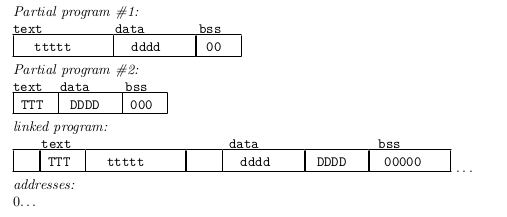Extensive collection of free software which can be used as an operating system or in parts with other operating systems.
The “Big” Utilities
- gold: the ELF only linker.
- gprof: the GNU profiler.
- gcov: the GNU coverage tool (not part of binutils, but GCC)
The “Small” Utilities
- ar and ranlib: creating static libraries.
- nm: list the symbols in a file.
- objcopy: copy binary files.
- objdump and readelf: examine binary files.
- size: print all the strings in a binary program.
- strip: strip all symbols from a file.
- c++filt: C++ name demangler.
- addr2line: convert an address to source code line.
- elfedit: update ELF headers.
Link Time Optimisation (LTO)
- Compile only to intermediate representation (IR), still held in
.ofiles. - It then links into one giant file, treating all globals as static.
- Apply optimisations to entire file.
The Assembler
libopcodes
It is in the opcode directory, with headers in include/opcode.
<target>-opc.cand<target>-opc.h(optional) are for assembly.<target>-dis.cand<target>-dis.h(optional) are for disassembly. It prints disassembled instructions and matches opcodes and operands.
Also need to have target specific changes in configure.in, disassemble.c and Makefile.am files in the opcodes directory.
CGEN will create these automatically for you.
Sections and Relocation
A section is a range of address with no gaps.
The linker ld reads many object files and combines them into a runnable program. When the assembler emits an object file, the program is assumed to start at address 0. ld assigns the final addresses for the partial program, so that different programs don’t overlap.
ld moves blocks of bytes to their run-time addresses. These blocks slide as rigid units, their length doesn’t change neither does the order of bytes. These are called sections. Assigning run-time addresses to sections is called relocation. It includes the task of adjusting mentions of object-file addresses so they refer to the proper run-time addresses.
An object file written by the assembler has at least three sections:
textdatabss
To let ld know which data changes when the sections are relocated, and how to change that data, as also writes to the object file details of the relocation needed. ld must know this each time an address is mentioned:
- Where in the object file is the beginning of this reference to an address?
- How long (in bytes) is this reference?
- Which section does the address refer to? What is the numeric value of
(address) - (start-address of section)? - Is the reference to an address program-counter relative?
Every address as ever uses is expressed as (section) + (offset into section).
Linker Sections

- text and data section: they hold the program, they are treated as separate but equal sections. When the program is running however, the text section is unalterable as it is often shared among processes: it contains instructions, constants etc. The data section is usually alterable, for example C variables would be stored there.
- bss section: it contains 0 bytes when the program begins running. It holds uninitialised variables or common storage.
- absolute section: address 0 of this section is always “relocated” to runtime address 0. This is useful if you want to refer to an address that
ldmust not change when relocating. - undefined section: catch-all for address references to objects no in the preceding sections.
Symbols
The programmer uses symbols to name things, the linker uses symbols to link, and the debugger uses symbols to debug.
typedeffromstruct symbolinas.h.- Defined in
symbols.c.
Labels
They are written as a symbol immediately followed by a colon :. The symbol then represents the current value of the active location counter, and is, for example, a suitable instruction operand.
If you use the same symbol to represent two different locations: first definition overrides any other definitions.
Fixup
More here.
Anything that cannot be resolved in the first pass. It is either resolved at the end of assembly or else becomes a relocation.
Resources
- Binutils Porting Guide (here)
- Linker Relaxation
- Relocations
- RISCV Toolchain
- Compiler Toolchains
- GCC
- Fix-ups